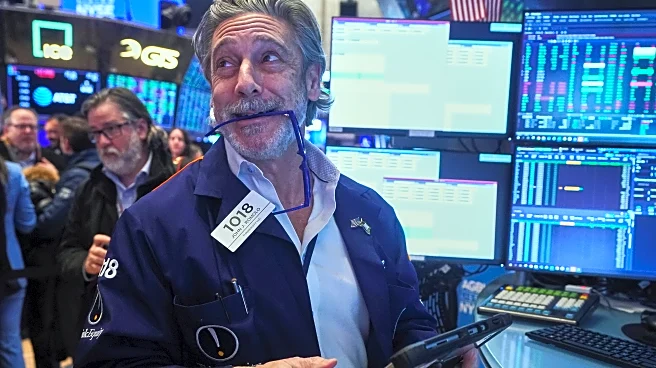What's Happening?
The Federal Reserve Bank of New York released its latest Survey of Consumer Expectations, revealing a shift in consumer concerns from inflation to the job market. In October, households anticipated a decrease
in inflation rates, expecting it to be 3.2% a year from now, down from September's 3.4%. However, concerns about the job market have intensified, with respondents predicting a higher unemployment rate and difficulties in finding employment if they were to become unemployed. Despite these concerns, there is less anxiety about job loss compared to the previous month. The survey also noted mixed expectations for future earnings and commodity prices, with anticipated declines in gasoline and food prices but a rise in medical costs. The survey was conducted during a period marked by a government shutdown and heightened fears about the job market outlook.
Why It's Important?
The shift in consumer concerns from inflation to employment highlights the evolving economic landscape in the U.S. While inflation remains a critical issue, the growing apprehension about job security and employment opportunities could have significant implications for economic policy and consumer behavior. The Federal Reserve's recent decision to cut interest rates aims to support the job market while managing inflation, indicating a delicate balance in economic strategy. This shift in focus may influence future policy decisions, impacting industries reliant on consumer spending and employment rates. The survey's findings suggest that while inflation expectations are stabilizing, the job market's uncertainty could affect consumer confidence and spending patterns, potentially influencing broader economic growth.
What's Next?
The Federal Reserve's interest rate cut to the 3.75%-4.00% range reflects its strategy to bolster the job market while controlling inflation. As consumer concerns about employment grow, policymakers may need to consider additional measures to support job creation and economic stability. The survey's insights could prompt discussions among economic stakeholders about the need for targeted interventions to address employment challenges. Businesses and industries may also need to adapt to changing consumer priorities, focusing on job security and financial stability. The ongoing government shutdown and its impact on economic sentiment could further influence policy decisions and market dynamics in the coming months.
Beyond the Headlines
The survey's findings underscore the complex interplay between inflation and employment concerns, highlighting the broader economic challenges facing the U.S. The shift in consumer priorities may reflect deeper societal issues, such as income inequality and access to employment opportunities. As inflation expectations stabilize, the focus on job market uncertainties could drive discussions about workforce development and education policies. The survey also points to potential long-term shifts in consumer behavior, with implications for industries reliant on discretionary spending. Understanding these dynamics is crucial for policymakers and businesses aiming to navigate the evolving economic landscape.










